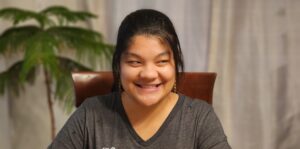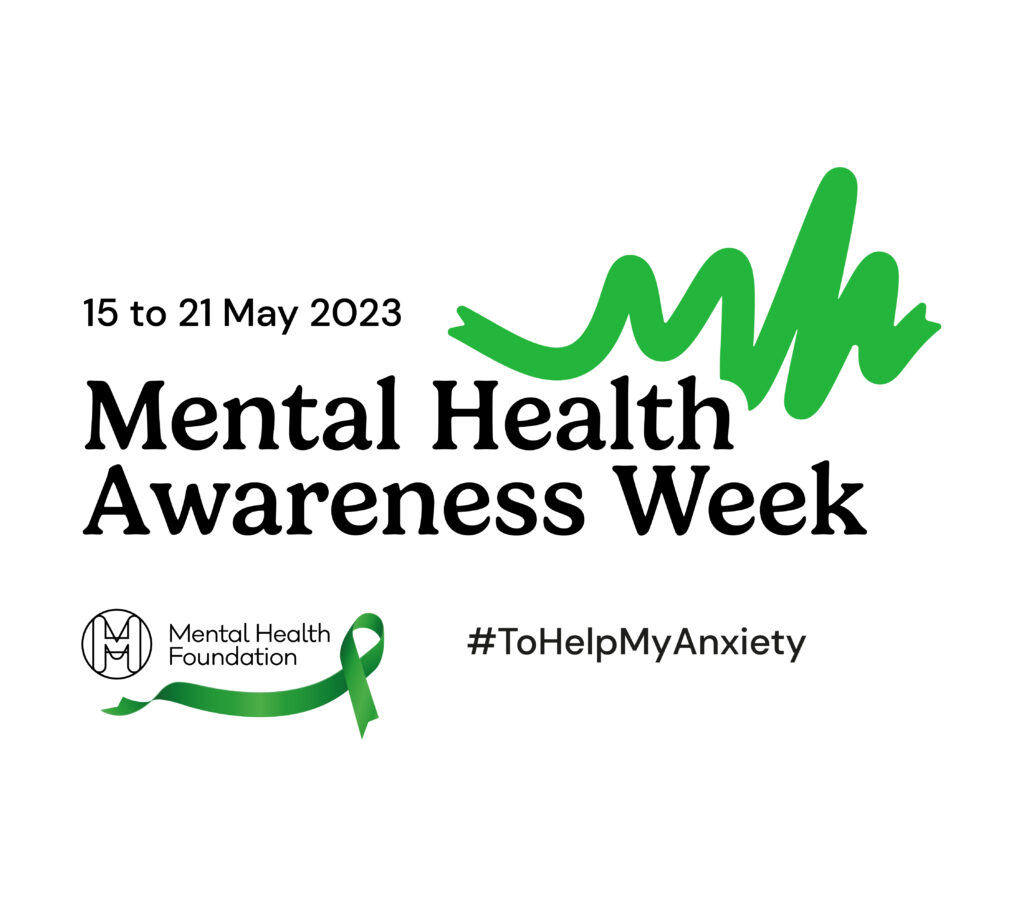Anxiety is the theme of Mental Health Awareness Week, hosted by The Mental Health Foundation.
Mental Health Awareness Week is encouraging people to share their experiences of anxiety and the things they have found to help using the hashtag #ToHelpMyAnxiety
Guenivir, a member of our RealSAM team, has bravely offered to share her experiences of living with sight loss and, at times, anxiety. In this article, Guen offers some useful suggestions and links to professional organsations that may be able to help you or a loved one.
Guen’s Story

“We all feel anxious from time to time. We worry, get nervous, feel uneasy about an imminent event or something we’re uncertain about. For those of us affected by sight loss, anxiety can increase from challenges including deteriorating vision, not being able to do what we could when we had more vision, not having transport to where we need to go, lack of resources, limited work opportunities, inaccessible information, low self-confidence, and isolation. Some of us are not directly living with sight loss, but we are supporting loved ones dealing with a disability, and this can be stressful.
Anxiety from disability and life in general is unavoidable, but it doesn’t have to take over.
Here are a couple of suggestions that can help reduce anxious feelings:
1. If you’re feeling anxious about a specific problem or a tangible need get information and seek support.
Having been a 24/7 carer for an elderly family member who was blind and had dementia for over 7 years, I often became anxious every time her condition progressed. One day it was perfectly fine for her to stay home on her own, then just like that, it was no longer possible. Changes like these brought stressful challenges. I found it helpful to sit down with a social worker from the Doctor’s office. She gave information about possible home health agencies, applying for assistance, and future nursing facilities to consider. It was also helpful to find tools that made everyday tasks easier like a shower chair and a baby monitor that would alert me if she needed something in the middle of the night.
In the same way, if you’re feeling anxious about a specific problem or a tangible need get information and seek support. Beyond help from friends and family, there are many local and national charities that provide resources. For example, RealSAM partners with RNIB, a national charity that supports anyone affected by sight loss.
They provide information and advice on everything from eye conditions, sight loss certification and registration, available benefits, independent daily living, assistive technology, housing, education, employment, and counseling. You can get help today by calling the RNIB helpline. Often, finding a solution to specific problems will resolve anxious feelings over them.
2. Talking to people can alleviate anxiety.
The possibility of losing my remaining vision due to Aniridia Syndrome is a reoccurring source of anxiety. Aniridia Syndrome is a congenital and genetic eye disease that causes the iris to be underdeveloped and complications like nystagmus, cataracts, and glaucoma. Due to nerve damage, my left eye is now totally blind, and my right eye is in danger of lens detachment.
Having adapted to living with sight loss all my life, I still can’t begin to imagine how I would go about homeschooling my children, working, cooking, cleaning, doing laundry, and being out and about with even less or no vision at all. Having family, friends, and people from church to talk to makes me feel better. They remind me that I’m not alone, share their experiences and how they’ve gotten through their own challenges. They encourage me with prayer and positivity.
If you’re anxious, talking to others can help. They may not completely understand what you’re going through, but often, just being able to voice our concerns is a relief. Knowing that we’re not alone is a big encouragement.
If you’re not comfortable talking to friends and family, reach out to a counsellor, or try out telephone befriending. There are many organisations supporting blind and visually impaired people who offer telephone befriending. Many have trained volunteers ready to listen. Others match you with people going through similar situations or schedule group call sessions throughout the month.
Here are a few options for telephone befriending:
RNIB Talk and Support
Sightline Telephone Befriending
Macular Society Telephone Befriending
Sight Cymru Telephone Befriending
https://sightcymru.org.uk/telephone-befriending-service-10-years-old/
Mental Health Foundation
https://www.mentalhealth.org.uk/
#ToHelpMyAnxiety
RealSAM can make it easy to stay connected and reach out for support.
There are now 12 million older people (aged 65 or over) living in the UK. (The Health Foundation), with 28% of women, and 22% of men said to be affected by depression. Helping our customers, who are often older people, to overcome loneliness and social isolation is why we exist.
If you’re finding it difficult to reach out to others for support with anxiety because your phone is inaccessible or is too complicated, take a look at the RealSAM Pocket or RealSAM Phone. Our fully voice-operated phones are friendly and easy to use for anyone facing age-related challenges, blindness, visual impairment, and other disabilities.
With our phones, it’s easy to make calls, send/receive messages, and manage contacts by voice. Learn more about RealSAM. We’re happy to answer any questions you have by calling us on 0333 772 7708.
By Guenivir Kendrick




